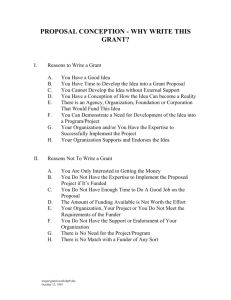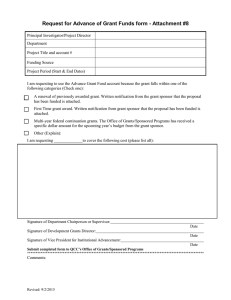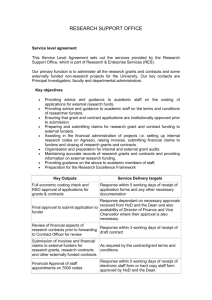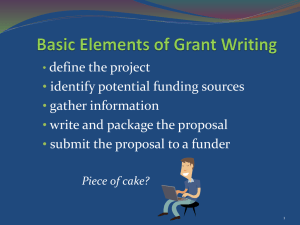Grants & Sponsored Research at Methodist University Wendy Hustwit
advertisement
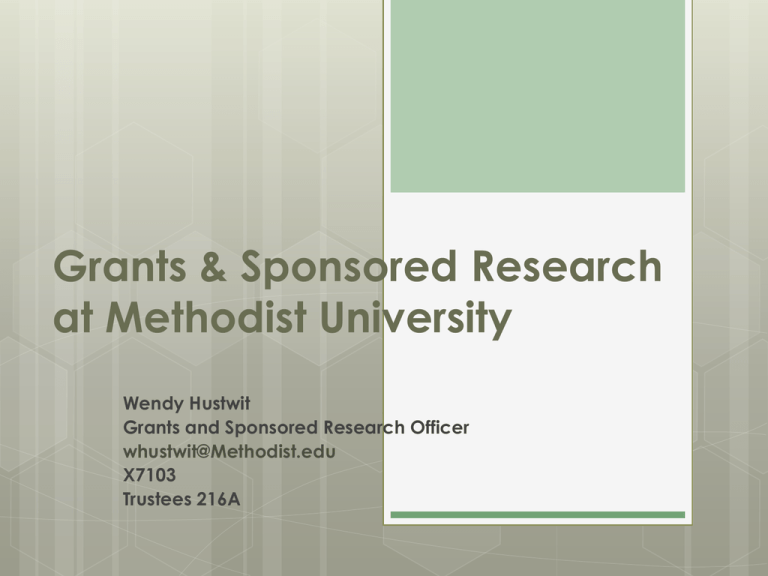
Grants & Sponsored Research at Methodist University Wendy Hustwit Grants and Sponsored Research Officer whustwit@Methodist.edu X7103 Trustees 216A Grant Funding “In good times and bad, we know that people give because you meet needs, not because you have needs.” -Kay Sprinkel Grace, author and philanthropist Grants vs. Donations Grants Funds for which grantor expects something in return (reports, evidence, results) Donations No or low expectations for something in return A set period to achieve objectives and spend funds No set period in which funds must be spent Penalties for failure to comply (give money back, no repeat grants) No penalties for noncompliance Funds awarded through competitive process Why Grant Funding? To carry out important projects that benefit students, faculty, and community, i.e., meeting needs. Test tools and strategies to improve student learning Perform research on student learning and/or scientific questions Jump-start a worthy, but unfunded, experimental project that has potential for meaningful impact on students, professors, science, other. Office of Grants and Sponsored Research Central repository for all grant applications and awards on campus VP Planning and Evaluation VP Advancement and University Relations Coordinator Planning & Evaluation Institutional Research & Effectiveness Grants & Sponsored Research Office of Grants and Sponsored Research Central repository for all grant applications and awards on campus GSR assists in the pre-award stage: Consults with Project Lead on departmental needs Researches and identifies funders Fosters relationship between Project Lead and Funder Facilitates Grant Team meetings to develop proposal Assists with drafting proposal/application Distributes proposal for final review and signatures Submits final proposal on behalf of Project Lead GSR assists in the post-award stage Assist Project Lead in financial and programmatic reporting Helps coordinate financial and administrative support if necessary Office of Grants and Sponsored Research Central repository for all grant applications and awards on campus GSR also offers professional development opportunities Basic grant seeking Discipline-specific grant opportunities STEM Humanities Student Services Specific topics on grant seeking Developing your Statement of Need Others Typical Grant Team Members Subject Matter Experts Institutional Advancement Business Office Project Lead & Grant Writer External Partners Admin Support (HR, Facilities, Student Life) Institutional Research Institutional Review Board (if nec.) Typical Proposal Workflow Project Lead consults with Grant Writer FIRST about an idea and/or prospective funder. The university may already be working on a project that could affect or be affected by your idea. Research funders and learn their request guidelines. Identify/recruit Grant Team Develop & Refine Project and Proposal Submit Proposal! Common Proposal Format I. Introduction Who we are and why we’re unique (deserving) II. Need Statement The issue(s) affecting students and evidence to back it up III. Goals & Objectives Our plan to address issues and why it will work IV. Methods Clear steps to achieve plan (staff, training, equipment, etc) V. Evaluation How we measure the success of our plan VI. Sustainability How we will continue success after grant period VII. Budget & Budget Narrative Line item description of costs to carry out our plan After Submission Notification in 2-6 months Look for additional funders to submit similar plan/proposal May be able to implement some things without funding anyway We Got the Grant! Thank You Letter and Celebrate Consult with funder again (and again, and again) Start Your Plan! Stick to the reporting schedule Stay in contact with the funder Or, We Didn’t Get the Grant This happens often, don’t be discouraged. You still have a well thought-out, written plan for your project. Ask funder for feedback on your proposal Tweak some (or a lot) and re-apply next year Find other sources and tweak as needed for their guidelines Finding STEM Funding STEM Grants.com http://stemgrants.com/category/university-grant-opportunities/ National Science Foundation – www.nsf.gov Improving Undergraduate STEM Education S-STEM (scholarships for low-income, disadvantaged students Google RISE Awards (Computer Science) https://www.google.com/edu/resources/programs/google-rise-awards/index.html#/!overview Duke Energy Foundation – STEM education, mostly k-12 Alfred P. Sloan Foundation – STEM research Simons Foundation NC GlaxoSmithKline Foundation http://www.ncgskfoundation.org/index.html Lab equipment and supply companies Vernier http://www.vernier.com/grants/nsta/ Brainstorming Funders want topical and important projects that have the potential to produce far-reaching results or evidence. DISCUSS! What kind of projects . . . • Are topical? • Are important (for science, for student success, etc.)? • Will produce results (evidence, enrollment, retention, etc.)? And also . . . • align with MU’s Strategic Plan? • are feasible/achievable within the next year or so? . . . if we just had a some funds to help with equipment, training, staffing, stipends, books, training, etc.
